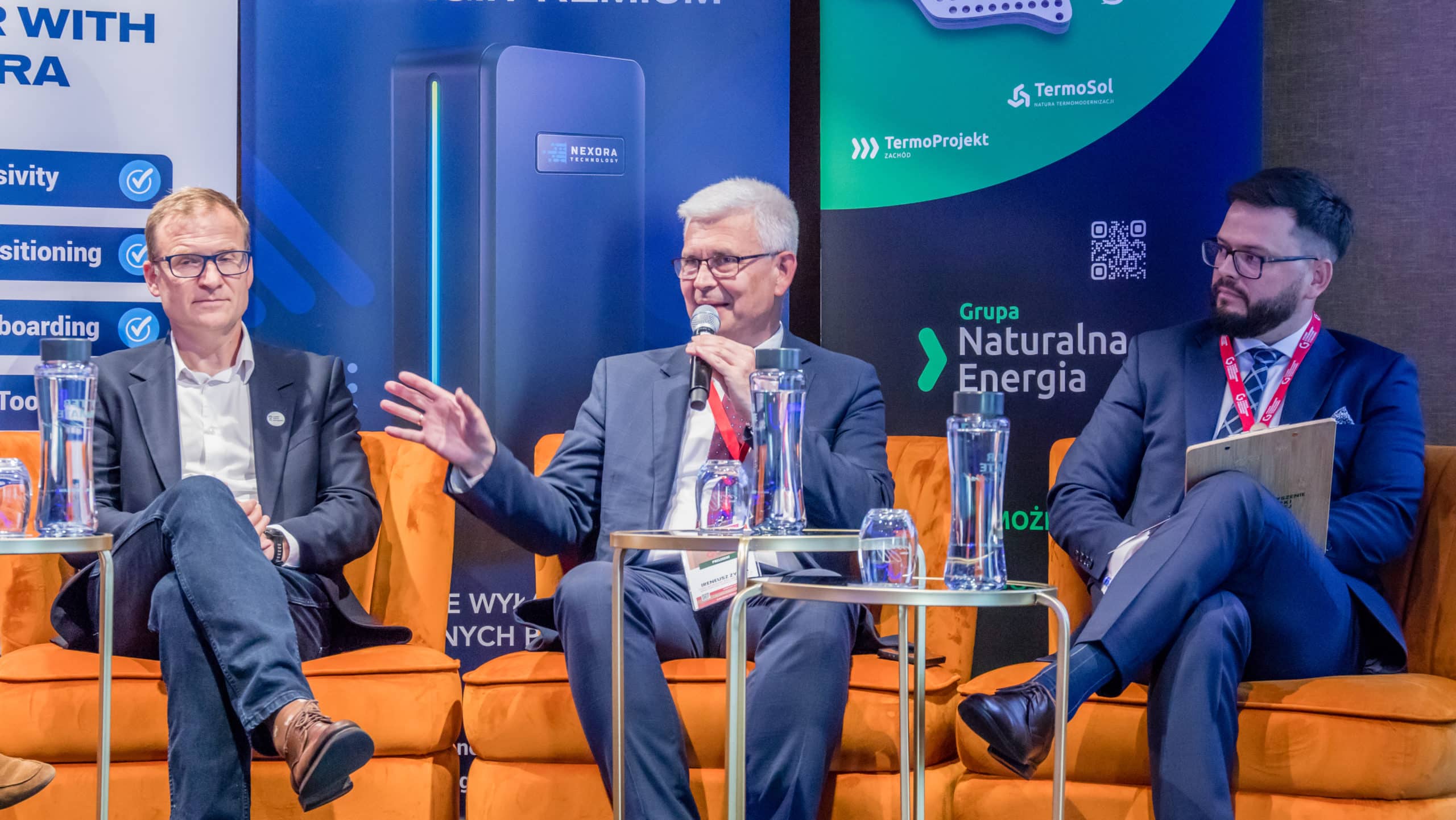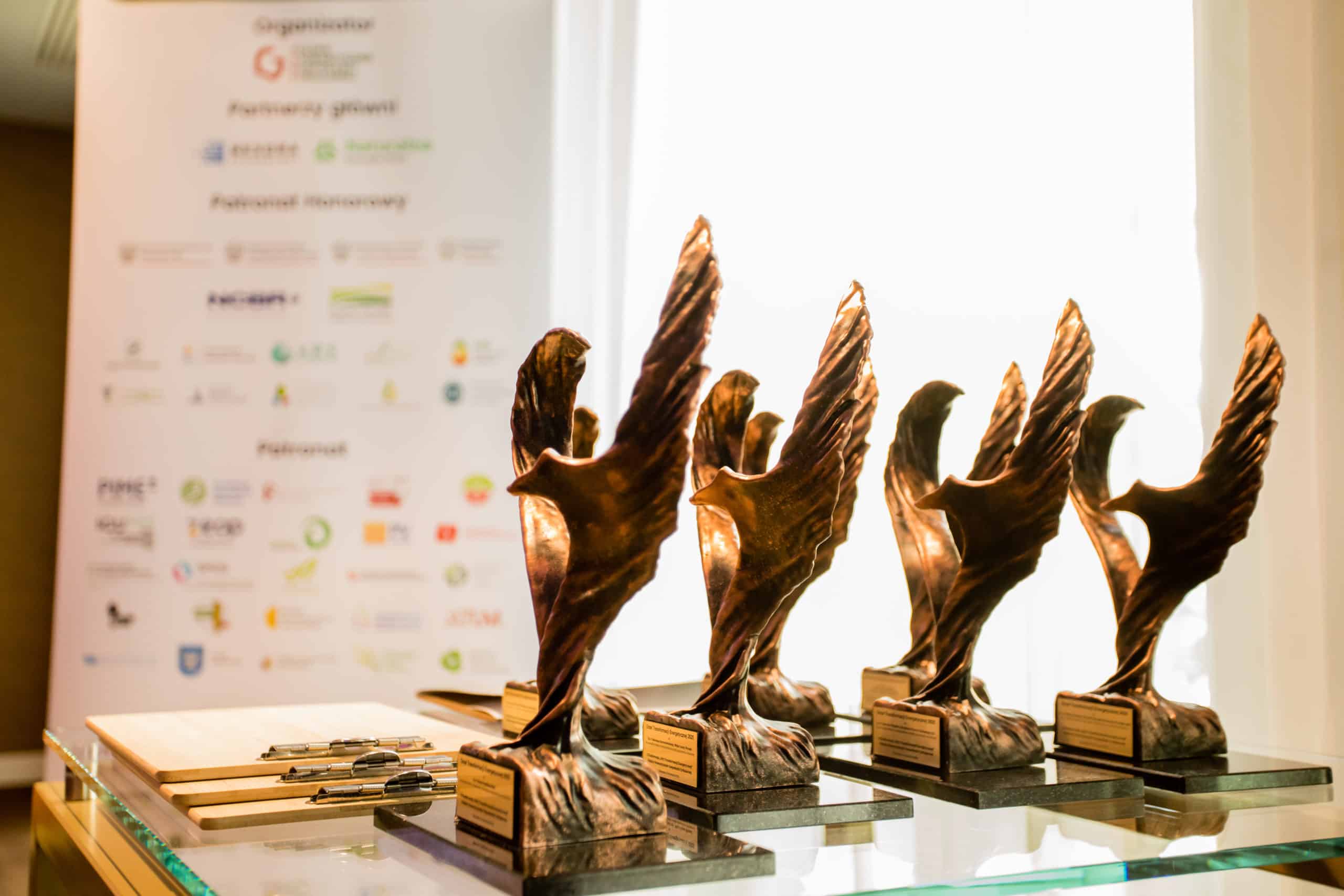The 2nd “Eagles of Energy Transition” Conference, organized by the Polish Association of Circular Economy (PSGC), took place on September 8, 2025, at the NYX Hotel in Warsaw. The event brought together several hundred participants – representatives of business, academia, local government, and administration – who discussed how to accelerate the energy transition in Poland and the role of the circular economy in this process.
The event was led by Aleksandra Kostka, who has been a PSGC Ambassador for over two years, and Piotr Dzięcielski.
Partnership for Transformation
This year’s conference had exceptional main partners. Naturalna Energia.plus, a leader in micro- and small-scale agricultural biogas plants, and Nexora Technology, an American company specializing in modern energy storage and energy management systems, actively supported the event.
The presence of these partners emphasized the practical dimension of the conference – the discussion was not limited to theory but focused on real solutions already being implemented in the Polish economy and energy sector.
Ministerial Patronage
The event was held under the honorary patronage of five ministries: the Ministry of Agriculture and Rural Development, the Ministry of Science and Higher Education, the Ministry of Funds and Regional Policy, the Ministry of Energy, and the former Ministry of Industry. Honorary patronage was also granted by the National Centre for Research and Development and the National Support Centre for Agriculture, who, by supporting the conference, demonstrated that energy transformation is a priority not only for businesses but also for the administration and the entire state.
Experts on Stage – Three Thematic Panels and Powerful Industry Names
Panel I: Challenges and Barriers to the Development of Renewable Energy Sources in Poland, as well as promising technologies such as energy storage as a response to overproduction, and intelligent energy management systems and their impact on the development of renewable energy sources.
Among the panelists, we heard inspiring statements from:
Stefan Traczyk, President of the Association of Foresters and Forest Owners
Remigiusz Ramm, expert and practitioner specializing in the energy market
Ewa Malicka, President of the Management Board of the Association for the Development of Small Hydropower Plants
Piotr Kwiatkiewicz, Professor, Ph.D., Eng., Adam Mickiewicz University in Poznań, President of the Foundation for Clean Energy
Marcin Więzik, Managing Director of Nexora Technology in Europe
“We need to simplify investment procedures, because today, entrepreneurs and local governments waste months, sometimes years, obtaining permits,” emphasized Remigiusz Ramm, an energy market expert.
“Transformation must be conducted with respect for natural resources and biodiversity, otherwise instead of solving one problem, we will create new ones,” added Stefan Traczyk, President of the Association of Foresters and Forest Owners.
“The development of energy storage and intelligent management systems is not the future, but the present. Without them, a stable energy system is impossible,” added Marcin Więzik, Managing Director of Nexora Technology in Europe.
“We need to simplify investment procedures, because today, businesses and local governments waste months, sometimes years, obtaining permits,” emphasized Remigiusz Ramm, an energy market expert.
“Transformation must be conducted with respect for natural resources and biodiversity, otherwise, instead of solving one problem, we will create new ones,” added Stefan Traczyk, President of the Association of Foresters and Forest Owners.
“The development of energy storage and intelligent management systems is not the future, but the present. Without them, a stable energy system is impossible,” added Marcin Więzik, Managing Director of Nexora Technology in Europe.
“The potential of rivers is untapped, and it is worth tapping into. Unfortunately, in the area of hydropower plants, the legal system is overregulated, and investments take years,” noted Ewa Malicka, President of the Management Board of the Association for the Development of Small Hydropower Plants.
“Unfortunately, tax breaks for storage facilities are inadequate to the prices of storage facilities,” noted Dr. Hab. Eng. Piotr Kwiatkiewicz, professor at Adam Mickiewicz University in Poznań.
Panel II: was devoted to the social and economic aspects of the energy transition – implementing the principles of the circular economy in society and industry, the role of recycling and reuse in the energy transition, and ways to convince society to invest in renewable energy sources.
Many distinguished names appeared in this panel:
- Ireneusz Zyska – Member of the Polish Parliament, former Deputy Minister at the Ministry of Climate and Environment
- Andrzej Guła, co-founder and leader of the Polish Smog Alert
- Monia Grążka, Deputy Director of the Department of Infrastructure Programs at the Ministry of Funds and Regional Policy
- Bartłomiej Dawidczyk – President of the Management Board of the Polish Circular Economy Association
- Jacek Wiśniowski – Mayor of Lidzbark Warmiński

“The energy transition is not a cost, but an investment in the future. If we boldly choose renewable energy today, in a few years we will gain cheaper energy and cleaner air,” said Ireneusz Zyska, Member of the Polish Parliament and former Deputy Minister of Climate.
“Without public support and citizen education, the transformation will not be complete. It is the residents of cities and municipalities who must become its true ambassadors,” emphasized Andrzej Guła, co-founder of the Polish Smog Alert.
“When talking about the circular economy, we need to show people real savings, show what they can gain, for example, from thermal modernization, and quantify it in złoty,” emphasized Bartłomiej Dawidczyk, President of the Polish Smog Alert Council.
“The circular economy promotes a better life by spending less on everyday costs,” said Jacek Wiśniowski, Mayor of Lidzbark Warmiński.
Panel III: “The Impact of Renewable Energy on Energy Prices and the Competitiveness of the Polish Economy – the Role of Local Governments in the Development of Renewable Energy Sources, the Role of Biogas Plants.”
This panel featured speakers representing various sectors – from science, through administration, to entrepreneurs operating directly in the industry:
- Mr. Adam Orzech, President of the Management Board of Naturalna Energia.plus
- Dr. hab. Alina Kowalczyk-Juśko, University of Life Sciences in Lublin
- Józef Kowalczyk, President of the Euro-most Foundation, former Undersecretary of State at the Ministry of Ownership Transformation and the Ministry of Treasury
- Dr. Andrzej Lewicki, Poznań University of Life Sciences
- Dr. hab. eng. Paweł Kowalczyk, Assistant Professor at the Jan Kielanowski Institute of Animal Physiology and Nutrition, Polish Academy of Sciences
“The Polish countryside can become a pillar of transformation. Agricultural biogas plants and local energy sources offer an opportunity for cheaper energy and new jobs,” noted Adam Orzech, President of the Management Board of Naturalna Energia.plus.
“Biogas plants are capital-intensive investments; without a subsidy system, we won’t achieve much as a country. To develop the sector, procedures and support must be developed. Either we take real action, or the entire biogas business will fall into the hands of Western corporations,” concluded Józef Kowalczyk, President of the Euro-most Foundation.
“Biogas plants stabilize renewable energy sources – wind turbines or photovoltaics. But their operating model must be carefully considered so as not to purchase substrate, but to use waste that is available locally,” said Dr. Andrzej Lewicki from the Poznań University of Life Sciences.
“Biogas plants also bring indirect benefits, such as jobs and closing the waste cycle within the municipality,” noted Dr. Hab. Alina Kowalczyk-Juśko from the University of Life Sciences in Lublin
Eagle Energy Transition Awards – Awards for Leaders

The highlight of the event was the presentation of the “Eagle of Energy Transition” statuettes. Honorable mentions were awarded to:
- Stefan Krajewski – Minister of Agriculture and Rural Development,
- Adam Orzech – President of the Management Board of Naturalna Energia.plus,
- Marcin Więzik – Managing Director of Nexora Technology in Europe,
- Andrzej Guła – co-founder of the Polish Smog Alert,
- Jacek Wiśniowski – Mayor of Lidzbark Warmiński,
- Mariusz Korzeniewski – Mayor of the Wyszki Commune,
- Beata Pawlikowska – traveler and writer.
Although Beata Pawlikowska was unable to attend in person, she sent a special thank-you message to the conference participants in the form of a video recording from Peru. “From this extraordinary place, I would like to thank you with all my heart for this extraordinary award, which takes on additional symbolic meaning here,” she said in her speech from nearly 4,000 meters above sea level. in front of the Temple of the Sun
“The award is a commitment for me to continue promoting solutions that truly transform the Polish energy sector,” emphasized Marcin Więzik after receiving the statuette.
The statuette was accepted on behalf of Minister Krajewski by Paweł Kowalczyk, a professor at the Polish Academy of Sciences, who served as an expert on Panel III that day.
The awards came as a huge surprise to the laureates, as none of them knew in advance that they would receive this distinction and the statuette, which was designed especially for the occasion by the renowned sculptor Adam Fedorowicz, the creator of, among others, the Eagle statuette – an award from the Polish film world, awarded for over a quarter of a century for outstanding achievements in the cinematographic industry.
PSGC – a platform for dialogue and cooperation
The Polish Circular Economy Association has been promoting the circular economy model as a driver of change in the Polish economy for years.
“I hope this meeting will be the beginning of new projects, new changes, and new actions,” enthused Bartłomiej Dawidczyk, President of the Polish Circular Economy Council (PSGC). “Such events are needed in Poland right now because we are at a turning point. The Polish energy sector requires modernization, and at the same time, we must meet EU and global climate commitments. Transformation is not a choice, but a necessity. And right now, we need a conversation – an open, substantive one, bringing together various groups. This conference is a platform for dialogue between government and local government administration, NGOs, and the voice of society; change and transformation require the cooperation of all.”
“From its inception, the Polish Circular Economy Association has focused on uniting the business, scientific, and local government communities around the idea of a green economy. Today’s conference is the best proof of this – because only by working together can we truly create change and set directions that will make the Polish energy sector more sustainable and competitive, including on the global market,” continued Bartłomiej Dawidczyk.
“Without a circular economy, the energy transition will not be complete. We must not only produce green energy, but also manage raw materials wisely and minimize waste,” argued Bartłomiej Dawidczyk, President of PSGC.
“Today, we looked at the energy transition and the circular economy from various perspectives – from broad, strategic visions of the future, through practical technological solutions, to local initiatives and real-world implementation examples. We discussed the difficult – the barriers and challenges, but also the hopeful – innovation, determination, and growing social awareness,” emphasized PSGC Vice President Daria Włodara.
“In summary, I can confidently say that this year’s conference was not just a meeting of experts, but a true forum for dialogue, where theory met practice, and strategic visions were confronted with local and social realities. It was precisely this diversity and openness that made the conference so meaningful and left us with many important inspirations for further work, including that related to next year’s conference, which will undoubtedly – like this year’s event – be the most important and largest nationwide industry meeting. We face many challenges, a lot of work, but also the satisfaction of working for future generations,” Daria Włodara, Vice President of PSGC, concluded the conference.
Lessons for the Future
The 2nd “Eagles of Energy Transformation” Conference demonstrated that Poland has a great opportunity to become a leader in the green transformation. Success requires cross-sectoral cooperation, a diversity of perspectives, a shared vision, and consistent action. Dialogue, mutual support, but also openness to diversity and partnership priorities – these are the keys to success, which were loudly emphasized during the 2nd “Eagles of Energy Transformation” Conference on September 8, 2025, in Warsaw.
A full report from the event and photos are available at: www.psgc.pl/konferencja-2025.
Portal OZE magazine is the media patron of the event.
